Global Fund Approves Emergency TB Funding for Syrian Refugees
18 December 2014
GENEVA - The Global Fund to Fight AIDS, Tuberculosis and Malaria has approved emergency funding to support the prevention, diagnosis and treatment of tuberculosis among Syrian refugees in Lebanon and Jordan.
The assistance, totaling US$3.3 million, comes from the Global Fund’s Emergency Fund, a special initiative designed to provide quick financing to fight HIV, TB and malaria in emergency situations. The Global Fund tapped the Emergency Fund for the first time in November to expand a mass-distribution campaign of mosquito nets in Liberia, a country severely hit by the Ebola outbreak.
The International Organization for Migration (IOM), which operates in Lebanon and Jordan, will be implementing the programs. The IOM is already providing active and early TB interventions among Syrian refugees, as well as TB drugs, equipment and awareness-raising.
With the civil war in Syria entering its fourth year, the Syrian refugee crisis is one of the greatest humanitarian challenges of recent times. Lebanon and Jordan host the majority of Syrian refugees, with 1.3 million refugees registered in Lebanon and 600,000 in Jordan, a situation which has severely overstretched the capacity of the public health sector in both host countries and represents an emerging public health concern.
“Tuberculosis is a disease that affects the most vulnerable,” said Lucica Ditiu, Executive Secretary of the STOP TB Partnership. “It is essential that we provide a coordinated response to Syrian families fleeing the war.”
In the case of Lebanon, a US$2 million program will contribute to the reduction of tuberculosis transmission, morbidity and mortality among Syrian refugees. Interventions include TB diagnostics and treatment services, improving knowledge of the TB epidemic and coordination of the TB response, enhancing service delivery and human resources and raising awareness of TB among target populations.
The influx of Syrian refugees to Lebanon has posed increasing challenges to the National Tuberculosis Program under the Ministry of Public Health. Sixty-one cases of all TB forms were identified among Syrian nationals during the first half of 2014, representing 17 percent of all TB cases notified. It is estimated that the number of Syrian refugees in Lebanon will reach 1.5 million by mid-2015, with estimated TB incidence among Syrian refugees at 25 out of every 100,000 people.
In Jordan, a US$1.25 million program will contribute to reducing drug-susceptible and resistant TB transmission, morbidity and mortality among Syrian refugees through provision of uninterrupted and sustained access to TB prevention, diagnosis, treatment and care services. In Jordan, there are 600,000 refugees, with estimated TB incidence of 48 out of 100,000 among this refugee population.
The proposed interventions are based on thorough needs assessments and strong consultation with the Office of the United Nations High Commissioner for Refugees (UNHCR), the World Health Organization (WHO), the IOM, the National Tuberculosis Programs in Lebanon and Jordan, technical officers and other relevant stakeholders.
With US$30 million, the Emergency Fund aims to prevent disruptions in treatment and essential services when standard funding channels, including the reprogramming of existing grants, cannot react fast enough. Syria has an existing TB grant, however the regular grant is limited to national boundaries and cannot be extended to address emerging needs of refugees in neighboring countries. Lebanon is not eligible to receive Global Fund support as an upper-middle income country.
“These interventions are in line with the scope of the Emergency Fund, which is to give us the capacity to quickly release funds when an emergency situation arises and when people’s lives are being put in danger by the disruption of our treatment and services,” said Mark Edington, Head of Grant Management at the Global Fund.







